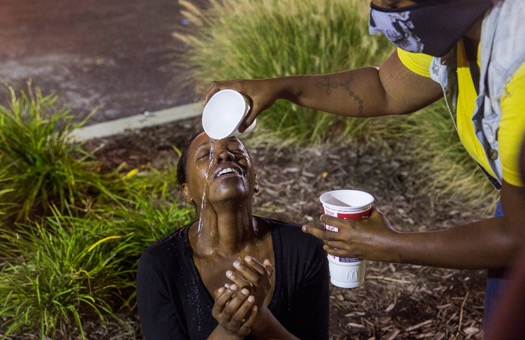How to Deal With a Tear Gas Attack
Being hit with a tear gas attack is not a pleasant experience by any stretch of the imagination. The effects on the body are immediate, excruciatingly irritating and can last long after exposure occurs. Let’s take a look at what you can expect if you are gassed as well as things you can do to minimize the impact of exposure.
How Tear Gas Works

Tear Gas attacks the respiratory system, mucous membranes and eyes. The gas reacts with moisture when the canister is activated, and it also reacts to the moisture on the body once it comes into contact with the skin or gets inhaled. The canister used to deliver the gas is often hot to the touch as the chemical reaction that activates the gas generates a lot of heat. People who get hit with a canister as it lands often report serious burns. Canisters that are lobbed by hand pose a lesser threat than those fired by launchers. There are reports of deaths occurring from people being struck by mechanically-launched canisters due to the force of impact.
It’s important to remember that the gas not only floats and lingers in the air, but the chemicals also get on clothing, skin, hair and surfaces of nearby objects. Coming into contact with these chemicals, breathing them in or touching the face or mouth can produce the same burning sensation long after the gas has settled and things appear safe once again. People who wear perfumes, lotions, creams or sunscreen will also experience longer-lasting risks as these and similar substances trap the chemicals and cause them to adhere to the skin.
The effects of tear gas are often immediate and severe. Severe burning of the mouth, airways and lungs will cause inflammation, coughing and excessive mucous production as the body tries to protect itself. The nose will begin to run profusely and the mouth and lips will become full of saliva. The eyes will tear up and force the victim to squint or close them altogether. Swelling and redness are common, and profuse tearing will occur within seconds after exposure.
What to do if Exposed

The first thing to do is try to get upwind of the gas if possible so that your exposure is minimized. If you have goggles or a face mask, put it on in order to protect your eyes and lungs as much as possible. If you don’t, take a handkerchief or use the inside of your jacket or sweatshirt to cover your face and shield your eyes. Do not use the outside of the fabric as it will most likely be contaminated by the chemicals. Get to an area that is out of the gas cloud as quickly as possible. Try to move with your arms outstretched so that that excess chemicals will fall off of your clothing or dissipate.
You want to take a couple of minutes to breathe in fresh air and allow your lungs to settle down. You also want to rinse your face and skin with soapy water in order to remove the residue. Do not rub your eyes, nose or mouth before rinsing, otherwise you will cause the chemicals to become further embedded into these sensitive areas. Remove clothing as soon as practical and take a shower or get hosed down with water. Add soap and rinse once or twice again. Pay particular attention to hard-to-clean ares such as underarms, inner thighs, the groin and under fingernails. Do NOT take a bath as the chemicals will linger in the water and re-settle on the body.
Thoroughly wash all clothing items that have come into contact with the gas at least two or three times to ensure that the residue has been removed. Do not mix contaminated clothing with other items. You may also consider discarding contaminated items as an extra precaution depending on the severity of the attack and the potency of the gas.
Remember that the best way to minimize exposure is to protect your skin, face and mouth. The best way to remove the contaminants is by rinsing, it’s really that simple. Keep in mind that the most severe symptoms after an attack go away soon after you are out of the gas cloud and decontaminated. If you find yourself struggling to breathe for more than a minute or two after exposure, or you develop lingering vision problems, seek medical attention immediately.


